Landscape Gardening in Alperton
Introduction to Landscape Gardening in Alperton
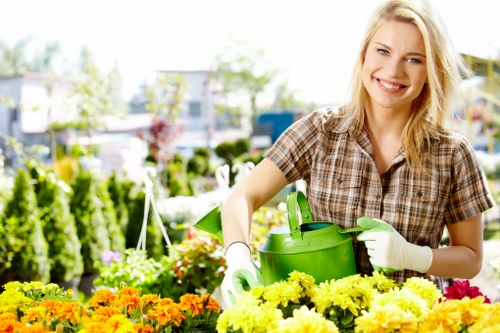
**Landscape gardening** in Alperton has become increasingly popular as homeowners seek to create aesthetically pleasing and functional outdoor spaces. Whether you have a small backyard or a vast garden, professional landscaping can transform your property into a personal paradise.
Alperton’s unique climate and soil conditions offer a diverse range of gardening opportunities. By understanding the local environment, you can select the right plants and materials to thrive throughout the year.
Investing in landscape gardening not only enhances the beauty of your home but also increases property value. A well-designed garden can be a sanctuary for relaxation, a space for entertaining guests, and a habitat for local wildlife.
Planning Your Garden Design
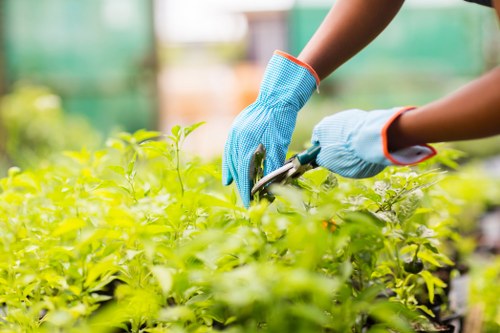
**Effective planning** is the cornerstone of successful landscape gardening. Start by assessing your outdoor space, considering factors such as sunlight exposure, soil quality, and existing vegetation.
Creating a layout that balances open areas with planted sections ensures a harmonious and inviting environment. Incorporate elements like pathways, seating areas, and water features to add interest and functionality.
Consider your lifestyle and how you intend to use your garden. Whether you’re looking to cultivate a vegetable garden, establish a play area for children, or create a peaceful retreat, your design should reflect your personal preferences and needs.
Choosing the Right Plants for Alperton
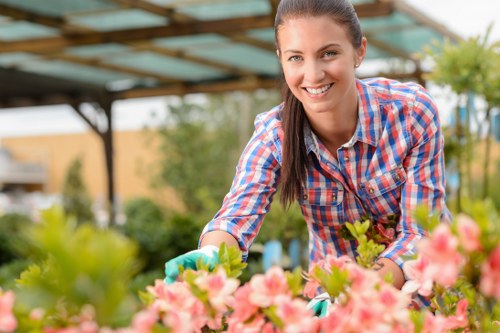
Selecting the appropriate plants is crucial for a thriving garden. In Alperton, it’s essential to choose species that are well-suited to the local climate and soil conditions.
Opt for a mix of evergreen and deciduous plants to ensure year-round interest. Incorporate native plants to support local wildlife and reduce maintenance requirements.
Consider the growth habits, colors, and textures of plants to create a visually appealing garden. Grouping plants with similar water and sunlight needs can make maintenance easier and promote healthier growth.
Hardscaping Elements in Landscape Gardening
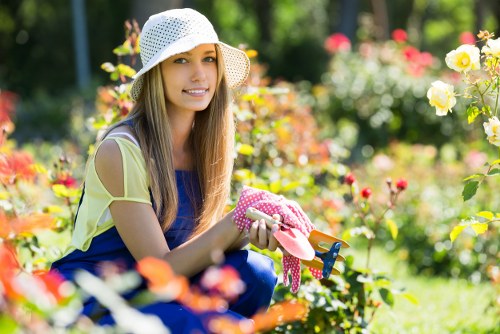
**Hardscaping** refers to the non-living elements of your garden, such as paths, walls, and structures. These elements provide structure and functionality, complementing the natural beauty of your plants.
Pathways made from stone, gravel, or pavers can guide visitors through your garden and connect different areas seamlessly. Retaining walls and raised beds help manage slopes and create defined planting zones.
Add features like pergolas, gazebos, or garden benches to create focal points and spaces for relaxation. These structures not only enhance the aesthetic appeal but also offer practical benefits, such as providing shade and shelter.
Maintenance Tips for a Lush Garden
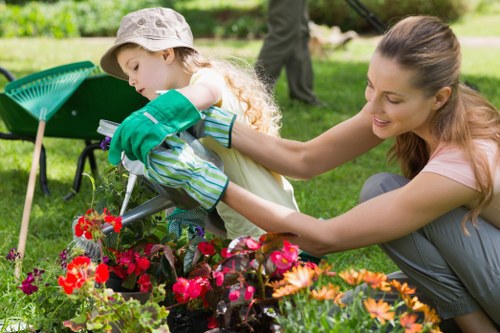
Maintaining a beautiful landscape garden requires regular care and attention. Establish a maintenance routine that includes watering, pruning, and fertilizing to keep your plants healthy and vibrant.
Weeding is essential to prevent unwanted plants from competing with your desired vegetation. Mulching can help retain moisture, regulate soil temperature, and reduce weed growth.
Regularly inspect your garden for signs of pests or diseases. Early detection and intervention can prevent minor issues from becoming major problems, ensuring your garden remains in top condition.
Seasonal Gardening in Alperton
Adapting your gardening practices to the changing seasons ensures a resilient and dynamic landscape. In spring, focus on planting new flowers and vegetables, while summer requires diligent watering and pest control.
Autumn is the perfect time for pruning and preparing your garden for the colder months. Winter tasks include protecting vulnerable plants and planning for the upcoming gardening year.
Understanding the seasonal shifts in Alperton helps you anticipate and address the needs of your garden, promoting continuous growth and beauty.
Eco-Friendly Gardening Practices
Incorporating eco-friendly practices into your landscape gardening can benefit both your garden and the environment. Use organic fertilizers and pesticides to minimize chemical impact.
Implement water-saving techniques such as drip irrigation and rainwater harvesting to reduce water consumption. Choosing native plants also supports biodiversity and reduces the need for excessive watering.
Composting kitchen and garden waste creates a sustainable source of nutrients for your plants, enhancing soil fertility and promoting healthy growth.
Hiring Professional Landscape Gardeners in Alperton
While some gardening tasks can be managed independently, hiring a professional landscape gardener can elevate your garden to the next level. Experts bring knowledge, experience, and creativity to design and implement customized solutions.
Professional gardeners can help you navigate complex tasks such as soil testing, plant selection, and installation of hardscaping elements. They also provide ongoing maintenance services to keep your garden in pristine condition.
Investing in professional services ensures that your landscape gardening project is executed efficiently and meets your specific vision and requirements.
Cost Considerations for Landscape Gardening
Understanding the costs associated with landscape gardening in Alperton helps you plan and budget effectively. Expenses can vary based on the size of your garden, the complexity of the design, and the materials used.
Basic gardening projects may include planting flowers and shrubs, while more extensive designs incorporate hardscaping elements like patios, walkways, and water features. Professional services, including design and maintenance, also impact overall costs.
Balancing your budget with your vision involves prioritizing essential features and exploring cost-effective options without compromising quality and aesthetics.
Incorporating Sustainable Practices
Sustainability in landscape gardening is about creating a garden that benefits both you and the environment. Use recycled materials for hardscaping and opt for sustainable plant varieties that require minimal resources.
Implementing energy-efficient lighting and using solar-powered garden features can reduce your garden’s carbon footprint. Additionally, creating habitats for pollinators like bees and butterflies supports local ecosystems.
By embracing sustainable practices, you contribute to environmental conservation while enjoying a beautiful and functional garden.
Enhancing Curb Appeal with Landscape Gardening
A well-maintained garden significantly enhances your home’s curb appeal. Strategic plant placement, vibrant colors, and well-designed layouts create a welcoming and impressive exterior.
Use a mix of perennials and annuals to ensure continuous blooms throughout the growing season. Incorporate lighting to highlight key features and provide safety around your property.
Regular upkeep, such as mowing, trimming, and mulching, maintains a neat and orderly appearance, making a positive impression on visitors and potential buyers.
Creating Functional Outdoor Spaces
Landscape gardening isn’t just about beauty; it’s also about functionality. Design your garden to accommodate various activities, from outdoor dining and entertaining to gardening and relaxation.
Include elements like seating areas, outdoor kitchens, and fire pits to expand the usability of your garden. Functional spaces add value to your property and enhance your outdoor living experience.
Thoughtful design ensures that your garden meets your practical needs while maintaining its aesthetic appeal, creating a balanced and enjoyable environment.
Personalizing Your Garden
Your garden should reflect your personal style and preferences. Incorporate elements that resonate with you, whether it’s a favorite color palette, specific plant varieties, or unique garden ornaments.
Personal touches like handmade garden decorations, custom furniture, and personalized pathways make your garden uniquely yours. These details add character and charm, setting your garden apart from others.
Expressing your individuality through your garden design creates a space that is not only beautiful but also meaningful and enjoyable for you and your family.
Maintenance Tools and Equipment
Having the right tools is essential for effective garden maintenance. Equip yourself with basic tools such as pruners, trowels, hoes, and watering cans to handle everyday gardening tasks.
Investing in quality equipment can make maintenance easier and more efficient, allowing you to care for your garden with ease. Regularly maintain your tools to ensure they remain in good condition and last longer.
Consider utilizing modern gardening technologies like automated irrigation systems and electric lawn mowers to save time and effort, enhancing your overall gardening experience.
Winterizing Your Garden
Preparing your garden for winter is crucial to protect your plants and ensure a healthy start in the spring. Remove spent plants, mulch beds, and cover vulnerable species to shield them from harsh weather conditions.
Prune trees and shrubs appropriately to prevent damage from snow and ice accumulation. Store gardening tools and equipment to keep them in good condition for the next season.
Planning for winter involves assessing your garden’s needs, implementing protective measures, and laying the groundwork for a thriving garden in the upcoming year.
Seasonal Planting Tips
Each season offers unique opportunities for planting and garden enhancement. Spring is ideal for sowing seeds and planting new perennials, while summer focuses on maintaining growth and managing pests.
In autumn, plant bulbs for spring blooms and prepare the soil for the winter months. Winter planting, though limited, includes hardy vegetables and other resilient plant species.
Understanding the best times to plant various species ensures optimal growth and a vibrant, colorful garden throughout the year.
Contact us today to transform your outdoor space with expert landscape gardening services in Alperton. Let our professionals help you create the garden of your dreams!

